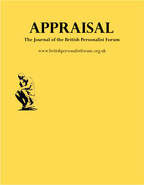|
|
Appraisal Volume 12, No.s 1 and 2, Spring and Autumn 2020
ISSN 2514-5584
Discussion: The Uncommon GoodR. T. Allen
The Special Issue of Vol. 12 of Appraisal was devoted to reviews of Jonas Norgard Mortenson's The Common Good: An introduction to Personalism. I had read the book and I still feel uncomfortable with the title, which could easily be taken to imply that personalism (better, personalisms) is all about the common good rather than persons. I do not mean that personalists or others, should ignore the common good, but that, not only is it an application of any personalism and not the core, but, more importantly, that it can be understood in several ways, some of which are antipersonal. I aim solely to warn against some of those ways.
An obvious formal definition is that it consists of what all members of the public have in common. At least four 'material' accounts can be given which would fit that definition. 1. The 'libertarian' account: that what we all share is a desire to choose for ourselves what we may do. To this is usually added the rider 'so long as we allow the same freedom to others'. This account is often the result of a value-scepticism which holds that there are no objective values and so we may all think and do as we please. This is the legacy of Locke and J.S. Mill whose case for liberty is explicitly based on scepticism about religion, ethics and politics. So also is the contemporary trend of much Analytic philosophy, as with discussions of 'the meaning of life' in which any such meaning is denied and therefore individuals can each look for and find some meaning [1]. But this contains a fatal contradiction: viz. precisely because we cannot know the truth in these matters, therefore we should not interfere with the like liberties of others. Why not, if all values are 'subjective'? For these reasons any personalist would reject it. 2. Another account is that of listing concerns and desires which we all share, such as health, security, and sufficient income to maintain or achieve a satisfactory way of life, which often translates into the public policy of a welfare state. This leaves open the choice of how we each pursue happiness. 3. Since personalists value the freedom of the individual, some may be content with that, but it could be taken to mean that the rest of life is just a matter of doing as we please as in (1). Thus (2) would easily become the proposal that the only good of individual and collective action is what is proposed for the common good. 4. From that could easily emerge a more aggressive and reductive egalitarianism, inimical to anything of higher value and out of reach, and motivated by envy: 'What I cannot have or do, no one else shall have or do' [2]. Hence because I cannot be a scientist, artist, musician, writer, etc., or by my own efforts attain to a better way of life, 'to get up, get out and get on', no one else should [3]. Aurel Kolnai, a younger associate in Hungary of Karl and Michael Polanyi, when in 1940 he arrived as a refugee in New York, became worried by the prevalence in America of the idea of 'the Common Man' who embodies these attitudes. He was at pains to distinguish him from the 'Plain Man', who, while not being interested in the arts and sciences, does respect them [4]. In his reply to the trade union official, John Hands also mentioned his father who had no interest in intellectual pursuits but was appalled at the behaviour of some academics in their private lives, and thought they especially should know better. He was a good example of the 'Plain Man'. This is a part of Kolnai's overall argument that without 'privileges' democracy can cease to be liberal and become totalitarian, the 'Common Man' being a pale version of the Marxist 'proletarian'. In short, a free society and any civilisation arises, lives and grows because of 'uncommon' persons and their pursuits which go beyond those of physical welfare, and who need the respect, protection and often the financing of sponsors, governments and the general public, because their achievements do enhance in one way or another and sooner or later, everyone's life. If we were all exactly the same, who would take initiatives, be a discoverer, pioneer or inventor? Welfare can make life more comfortable, or, at least, more bearable, but only uncommon persons and their activities can make it worthwhile. Indeed, 'uncommon' persons can promote greater welfare: consider the vast improvements in medical treatments and surgery. But the applied sciences of medicine, engineering and the like, would themselves be stultified if the pure natural sciences and mathematics were limited to what could be immediately applied to welfare and other practical applications, as in Marxist theory and practice and by democratic governments with a narrow outlook. True, the Ivory Tower can become self-enclosed and unproductive of anything except repetitions of what is already known and minute examination of mere details, but without it life generally would eventually follow suit. There is also another sort of 'uncommon man', the 'oddity', 'eccentric' or 'character' who may need to be cherished simply because he brings colour to what may otherwise be a rather dull and drab uniformity of life, as well as possibly being an inventor or discoverer of something that could turn out to be a further contribution to the common good. Thus, my argument is that 'the common good' must clearly include 'uncommon goods' which 'uncommon' persons pursue and which personalists in particular should cherish and protect against the reductive uniformity of collectivisms and envy. Notes
Comments on this discussionTo add a comment to this review, use the 'Add Comment to Article' item on the menu to the left. Any comments will be posted here. |
Proudly powered by Weebly

